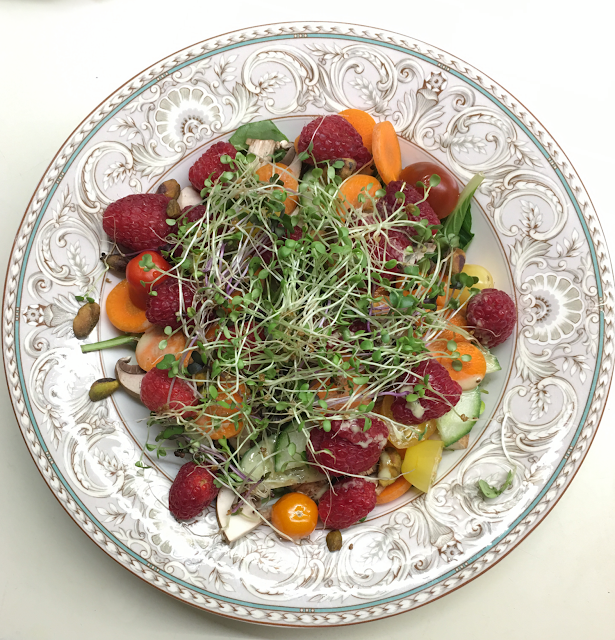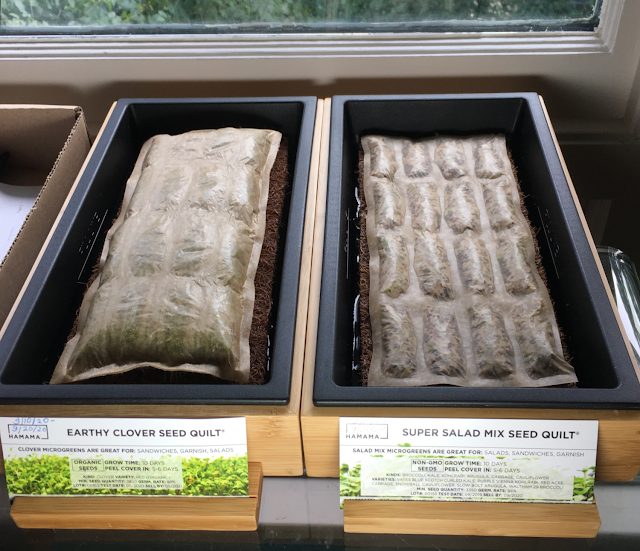
|
| With a Hamama Microgreens Starter Kit and the company's proprietary seed quilts, growing and harvesting fresh, delicious, and nutritious microgreens is nearly effortless! |
Fresh, crisp microgreens are colorful, refreshing, and extremely nutritious. Since last year, when I committed to making healthy lifestyle changes, including a special focus on healthy food choices, I have been adding microgreens to salads, sandwiches, soups, eggs, and other dishes as often as possible.
Although buying packaged microgreens at our local Whole Foods is an expensive and frustrating proposition, growing my own hadn't seemed like a viable option, given my poor track record with keeping even healthy plants alive, much less growing them from seed.
Then, four months ago, I found out about an innovative microgreens growing system from a company called Hamama, which was designed to be as as simple, effortless, and low-maintenance as possible, so that even container gardening newbies like me could grow these healthy, tasty, nutrient-dense greens year-round.
The proprietary, patent pending Hamama Seed Quilt Growing System is the brainchild of co-founders Camille Richman and Daniel Goodman, who met when they were mechanical engineering students at the world-renowned Massachusetts Institute of Technology. Following their graduation from MIT, they worked together full-time at the MIT Media Lab, researching high tech indoor agriculture. After growing food both in the lab and at home for several years, they wanted to make it possible for more people to experience the benefits of growing healthy food at home.
In May, I decided to order a Hamama Microgreens Starter Kit, including three seed quilts and a reusable grow tray. I was surprised and delighted by the results, and a few weeks later, I ordered two more growing trays and 18 more seed quilts. Although I've skipped a week here and there, I've successfully grown and harvested around more than a dozen seed quilts at this point. Now, I'm anxious to share my experience, and perhaps inspire others to try growing their own healthy, delicious, superfood microgreens, even if they have never had any experience, or luck, growing vegetables in the past.
P.S. Make sure to read all the way to the end of this review to find out how to get a 10% discount off the purchase price of your first order of a Hamama Microgreens Starter Kits, Seed Quilts, or other microgreens growing accessories!
Microgreens Are Superfoods That Pack a Powerful Nutritional Punch
Increasing our consumption of nutritious, dark leafy greens is an important part of healthy eating. The USDA Dietary Guidelines for Americans recommend eating more fruits and vegetables, including dark leafy greens. For those of us who have chosen a low carb, ketogenic approach to eating, dietary restrictions make it even harder to get enough nutrients from the foods we eat, rather than from supplements.
Adding more microgreens to our diets, in particular, provides even greater health benefits. A 2012 research study found that microgreens contain between four and 40 times higher concentrations of essential nutrients than their mature counterparts!
These nutrient-dense, immature plants can be excellent sources of key vitamins such as C, E, K, and also carotenoids including lutein and beta-carotene (a precursor to Vitamin A aka retinol), two important antioxidants provide a wide range of health benefits, including helping to protect our eyes against macular degeneration.

|
| We enjoy a large, colorful, salad with a generous helping of freshly harvested microgreens every day! |
Why Not Just Buy Packaged Microgreens Instead of Growing Them?
Unfortunately, many supermarkets and grocery stores either don't sell them, or run out of them quickly. Even when I've been lucky enough to find one or two containers, those commercially grown microgreens have cost a pretty penny. Far too often, the expensive organic microgreens we've bought at our local Whole Foods Market have become not just limp but slimy and inedible after just one or two days in the vegetable drawer of our fridge. Most are also sold in single-use, plastic clamshell packaging, which is bad for the environment.
Finding organic microgreens or ones that have been grown from non-GMO seeds can also be a challenge.
Unfortunately, since March, these problems have been further exacerbated by the widespread negative impact of the current, unprecedented health crisis.
The Pros and Cons of Using Hamama Seed Quilts vs. Growing Microgreens From Seed
Buying packets of loose seeds and growing them on a bed of moistened potting mix, soil, or coconut coir is, without question, the cheapest way to grow microgreens at home. However, it also requires watering the seeds once or twice a day, and monitoring their progress daily, from the the time they are planted until they are ready to be harvested, usually takes somewhere between 9 days and a few weeks. And they do best with 4–6 hours of direct sunlight, or natural light supplemented by a grow light(s).
While this may be a good option for experienced container gardening enthusiasts, not everyone was blessed with a "green thumb," or enjoys growing things from seed. Some of us just want to have convenient and consistent access to a variety of microgreens and enjoy them when they are at their freshest, tastiest, and most nutritious, and are happy to pay more for an approach that requires significantly less time and effort than growing these immature greens from seed.
That's why Hamama developed its proprietary seed quilt system, which makes growing fresh, delicious, nutrient-rich microgreens indoors as easy, effortless, and care-free as possible.
Anatomy of a Hamama Microgreens Seed Quilt
Each seed quilt consists of three layers (excluding the seeds):
- The bottom layer is a loosely woven coconut coir mat (aka coconut fiber mat or coconut husk pad).
- The middle layer is a thin sheet of white felt.
- The top layer is some type of unbleached paper.
The seeds are sandwiched between the white felt layer and the light brown paper cover, divided into 20 long, narrow, rectangular, "quilted" sections that hold the seeds in place in a fairly even distribution.
Key Benefits of the Hamama Seed Quilt Grow System for Microgreens
- By combining the seeds, the growing substrates, and the papery cover into a single, compact unit and pairing it with a perfectly-sized growing tray, Hamama has removed as many variables as possible.
- The Hamama Starter Kit contains everything you need to grow microgreens, except the 24–26 ounces of water for the initial soak. (Depending on the quality of your tap water, I recommend using filtered water.)
- Starting a new seed quilt takes as little as 1–2 minutes! After that, you can basically ignore it for the next 4–6 days, until the seeds have germinated.
- This bottom-watering and self-watering growing system is the closest thing to "set-it-and-forget it." Once you pour water inside the grow tray up to the fill line and briefly submerge the seed quilt to get all 20 sections evenly moistened, you shouldn't have to mist the seeds quilt or seedling, or top up the water. (Toward the end of the growing period, I try to check the water level every couple of days, if I remember. just in case it drops below the midpoint of the coconut coir mat.)
- The brown paper cover helps to filter the ambient light during the initial 4–6 day germination period, then it peels off easily to provide the seedlings with full exposure to the ambient light.
Hamama Microgreens Seed Quilts Are So Effortless, They Practically Grow Themselves!
Growing a Hamama microgreens seed quilt is as easy as 1-2-3:
- Do the brief initial "soak." Add water to the growing tray's marked fill line (no higher) and submerge the seed quilt for 10–30 seconds, just until all 20 sections have uniformly changed to a darker shade of brown.
- After 3–5 days, when the seeds have germinated, pushing against the paper cover and causing the sections to puff up or balloon, peel the paper cover.
- Approximately 7–10 days after the initial soak, harvest your microgreens!
You can harvest the entire seed quilt at once and store whatever microgreens you won't use immediately in the refrigerator, if you wish, or harvest a few sections at a time over the next few days.

|
| I often grow more than one Hamama seed quilt at a time |
What's Included In the Hamama Microgreens Starter Kit?
-
One reusable Grow Tray.
- Black plastic or white ceramic
- Your choice of three Hamama Seed Quilts (choose all one variety, or mix and match up to three different types)
- Easy growing instructions.
Choose From 10 Different Types of Microgreens Seed Quilts
Hearty Broccoli, Refreshing Cabbage, Spicy Daikon Radish, Super Salad Mix, Sweet Wheatgrass, Zesty Mix, Energizing Kale, Earthy Clover, Hot Wasabi Mustard, and Fragrant Fenugreek. All the seeds in Hamama's microgreens seed quilts are non-GMO Six are also organic (Energizing Kale, Fragrant Fenugreek, Hearty Broccoli, Spicy Daikon Radish, Earthy Clover, and Sweet Wheatgrass). The company is working on making the switch to an all certified organic line.
Save 10% on Your First Hamama Order!
Use my Hamama shopping link, add the products you want to the shopping cart, then use the discount code SUPERGREENS during checkout to get 10% off your product total.
Hamama Microgreens Starter Kit and Seed Quilts Review by Margaret Schindel
Posts About My Keto Diet Journey
My First Year on The Keto Diet
Preparing to Succeed on the Keto Diet, Part One
Preparing to Succeed on the Keto Diet, Part Two
Low Carb Muffins & Cupcakes: Treats to Enjoy on a Keto Diet
Low Carb Keto Chocolate Yogurt Granola Chip Pudding Recipe
Good Dee’s Keto Cookie Low Carb Baking Mix Review
Hamama Microgreens Growing Kit Review & Success Tips
My Favorite Hamama Microgreens Seed Quilt Accessories
Keto Cheddar Cheese Biscuits With Chives Recipe
The Ultimate Keto Hot Chocolate Recipe
The Best Low Carb Keto Gift Ideas: Keto Gift Guide
The Best Low Carb Keto Cinnamon Muffins
Wholesome Yum Keto Bread Mix and Yeast Bread Recipe
The Good Chocolate 100% Organic No Sugar Dark Chocolate Review
The Best Advice to Maintain Your Keto Diet Weight Loss
My New Irresistibly Delicious Keto Cheese Crackers Recipe
Luscious Low Carb Keto Triple Peppermint Cheesecake Brownies Recipe
Quick & Easy Livlo Blueberry Scones Keto Baking Mix Review
Snack Better With The Best Healthy Keto Cookie Dough Bites
The Best Quick and Easy Low Carb Keto Pizza Recipe
The Best Quick and Easy Low Carb Keto Shortcake Cupcakes Recipe
Comparing the Best Keto-Friendly Chocolate Hazelnut Spreads - No Added Sugars
The Best Low Carb Keto Sandwich and Burger Buns Mix
Blueberry Biscuit Scones — New, Easy, Low Carb Keto Recipe
The Best Keto Pizza Crust Mix With 0 Net Carbs
An Unusual, Delicious Strawberry Chocolate Tea With 0 Calories
Delicious Sugar-Free Keto Cookies That OREO Fans Will Love
Healthy Pistachio Cherry Chocolate Chip Marshmallow Cereal Treats Recipe
Easy, Decadent, High Protein, Sugar-Free Rocky Road Cottage Cheese Ice Cream
The Best Quick & Easy Low Carb Sausage and Ricotta Calzones
How to Make Refreshing Vanilla Italian Soda (With or Without Cream)
Reviews of the Keto Diet by Barbara C. (aka Brite-Ideas)
How I Stayed Committed to the Ketogenic Way of Eating



























